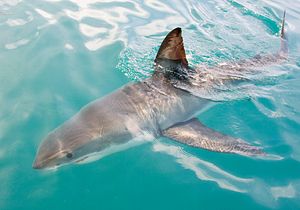For Australian swimmers and surfers, checking Twitter before taking a dip could be a lifesaver. Surf Life Saving Western Australia (@SLSWA), a volunteer-based association providing beach safety education and emergency rescue services, recently implemented a system that posts live tweets from more than 320 resident sharks. The updates – which include the shark’s species and approximate location – allow beachgoers to steer clear of areas with a high frequency of activity.
Scientists in Perth tagged the various sharks – which include great whites, tiger sharks, and bull sharks – with small GPS transmitters in order to track their movements along the coast. Whenever one of them swims within a kilometer of the beach, an alert is transmitted to a computer that generates a tweet in real time.
SLSWA, which is sponsored by the Department of Fisheries Western Australia, said that there are more than 160 different shark species inhabiting the 12,000 kilometers of regional coastline. Despite the large number, only the three species mentioned above pose “a significant risk to human safety.”
Below is an example of one of the service’s recent tweets:
Fisheries advise: tagged Tiger shark detected at North Cottesloe receiver at 07:46:00 PM on 25-Dec-2013
— Surf Life Saving WA (@SLSWA) December 25, 2013
Lifeguards, aided by a SLSWA rescue helicopter, also tweet live sightings:
Fisheries advise: White Shark 2.5 – 3m, had been sighted at Rottnest 500m offshore from Pt Clune. Sighting @ 1535 Reported @ 1610
— Surf Life Saving WA (@SLSWA) December 26, 2013
Fisheries advise: White Shark 2.5 – 3m, had been sighted at Rottnest 500m offshore from Pt Clune. Sighting @ 1535 Reported @ 1610
— Surf Life Saving WA (@SLSWA) December 26, 2013
“The speed at which the shark location data can reach people may ultimately save lives,” said Nature World News. “Western Australia is the world’s deadliest place for shark attacks – six people have died there from shark attacks in the past two years [with] the majority of fatalities attributed to [great] white sharks.”
In the current age of smartphones and tablets, Twitter alerts have a much better chance of being noticed than traditional warnings that would be streamed over the TV or radio – often after an attack had already occurred.
“You might not have got some of that information until the following day in which case the hazard has long gone and the information might not be relevant,” SLSWA spokesperson Chris Peck told Sky News. “Now it’s instant information and really people don’t have an excuse to say ‘we’re not getting the information’ – it’s about whether you are searching for it and finding it.”
The GPS tags will also give scientists a wealth of information regarding the sharks’ habits. The internal batteries can last for up to 10 years – but questions remain over whether some of the larger sharks will last that long.
The Perth government has approved a controversial shark culling to be implemented in January. Commercial fishermen are currently bidding for a contract that would allow them to place 72 drum lines off the coast of popular beaches. Great whites, tiger sharks, and bull sharks that measure more than three meters when captured will then be “humanely destroyed” with a firearm.
Activist groups, including Sea Shepherd Australia, have called the shark kill “disgusting.”

































